#poiré
Explore tagged Tumblr posts
Text
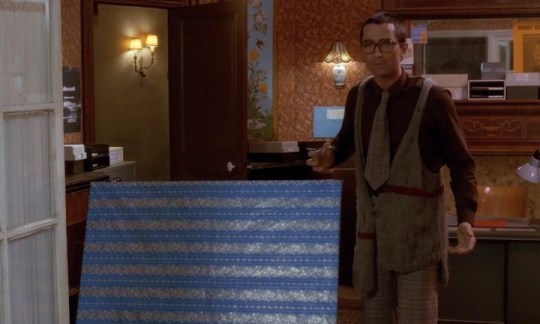
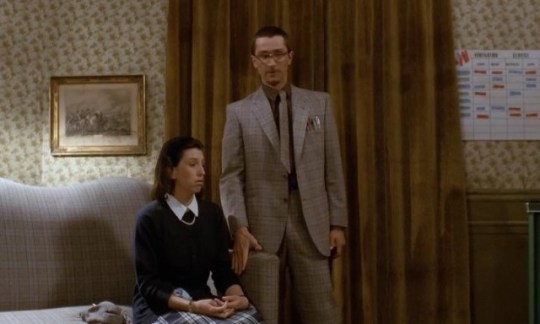
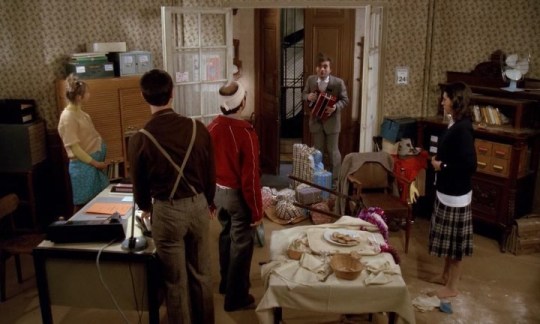
Murs et éclairages typiques des appartements parisiens de la bourgeoisie des années 1950 à 1990. Les pièces sont pensées pour y vivre, non pour les donner à admirer.
Fonctionnalité > Mondanité.
7 notes
·
View notes
Photo

1991 OPERACION CHULETA DE TERNERA. L'Opération Corned-Beef - Jean-Marie Poiré french lobby card
#Lobby Cards#submission#Operation Corned Beef#L'opération Corned Beef#Jean-Marie Poiré#Lobby Card#Mireille Rufel
5 notes
·
View notes
Text
youtube
Le Père Noël est une ordure, directed by Jean-Marie Poiré
Destinée, Guy Marchand
#le père noel est une ordure#jean-marie poiré#le splendid#vladimir cosma#guy marchand#destinée#soundtrack#Youtube
2 notes
·
View notes
Text
La blette (ou poirée)السلق
26 01 25

0 notes
Text
Extrait des Anges Gardiens (1 995, JM Poiré)
"Ce sont des babouches, que m'a très gentiment offert Mahmoud, le père du p'tit Rachid".
2 génies, scène brillante, notamment le liftier qui se fait éclater la gueule parce qu'il insinue que les deux hommes sont des flottants.
Basile Pesso, 18 octobre 2 024 (Fb) Avec extrait des Anges Gardiens (Jean-Marie Poiré, 1 995)
#basile pesso#jean marie poiré#cinéma#écrivains#journalisme#christian clavier#the reason is : why the fuck do you make believe that writing great songs is easy WHEN YOU NEVER WROTE ONE ?#all FUCKING LIES Under the Bridge is obviously not so simple and Take On Me Either. you spoil the magic for your fucking business#this is vomitive - so half naked supermarket fart.
0 notes
Text
youtube
Quelques messieurs trop tranquilles réalisé par Georges Lautner, coécrit avec Jean-Marie Poiré (1973), avec Michel Galabru, Jean Lefèvre, Paul Préboist, Miou Miou... 😍😍
youtube
La carapate réalisé par Gérard Oury (1978), coécrit avec Danièle Thompson, avec Victor Lanoux et Pierre Richard 😍
youtube
Psy réalisé par Philippe de Broca (81), écrit par Gérard Lauzier, avec Patrick Dewaere, Annie Duperey,... 😍
Carte blanche à Élisabeth pour les soirées ciné dans la salle équipée par Maxime en Ardèche. Mum a adoré
#cinéma#georges lautner#jean-marie poiré#gérard oury#danièle thompson#rire#comédie#philippe de broca#gérard lauzier#patrick dewaere
0 notes
Text
14 marzo … ricordiamo …
14 marzo … ricordiamo … #semprevivineiricordi #nomidaricordare #personaggiimportanti #perfettamentechic
2022: Akira Takarada, attore giapponese principalmente conosciuto per la serie di film Godzilla. Ha sposato Akiko Kojima, modella giapponese e Miss Universo 1959, nel 1966 divorziano nel 1984; hanno avuto una figlia, Michiru Kojima, nel 1967. (n.1934) 2022: Anna Montinari, attrice teatrale e modella italiana. Ha frequentato l’Accademia nazionale d’arte drammatica di Roma, ha iniziato la carriera…
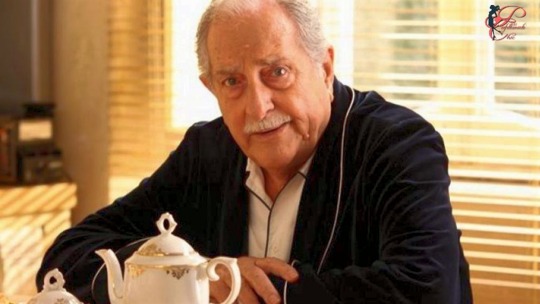
View On WordPress
#14 marzo#Akira Takarada#Akira Yoshizawa#Alain Bashung#Alessandro Cutolo#Alexander Granach#Alfred Zinnemann#Anna Montinari#Bob Burns#Carl Sebastian Martin Wery#Carl Wery#Edna Woolman Allaway#Edna Woolman Chase#Edythe Marrenner#Enrique Tomás Delgado Jiménez#Fred Zinnemann#Giangiacomo Feltrinelli#Helen Ferguson#Henry Darrow#Ivan Rassimov#Jean Poiré#Jean Poiret#Jessaja Gronach#Karl Marx#Marcel Rochas#Maurice Julien Marie Robinet#Maurice Ronet#Morti 14 marzo#Morti oggi#Peter Aurness
0 notes
Text

TIARA ALERT: Queen Mary of Denmark wore Princess Louise's Pearl Poiré Tiara for the banquet during the state visit from Iceland at Christiansborg Palace in Copenhagen, Denmark on 8 October 2024.
#Tiara Alert#Queen Mary#Denmark#Danish Royal Family#tiara#diadem#royal jewels#tiaras#diadems#royaltyedit#pearl
194 notes
·
View notes
Text
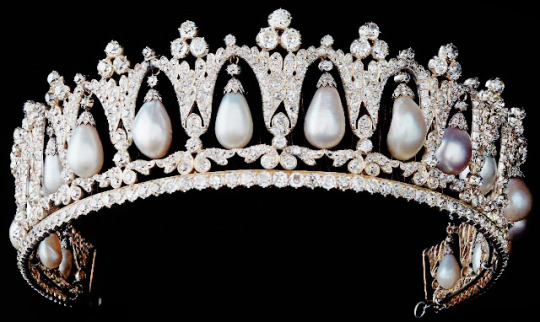
Royal Tiara Challenge 2024: {10/31} -> Favourite Pearl Tiara: The Pearl Poiré Tiara
586 notes
·
View notes
Text
The Extreme Edge
MARIUS had reached the Halles.
There everything was still calmer, more obscure and more motionless than in the neighboring streets. One would have said that the glacial peace of the sepulchre had sprung forth from the earth and had spread over the heavens.Nevertheless, a red glow brought out against this black background the lofty roofs of the houses which barred the Rue de la Chanvrerie on the Saint-Eustache side. It was the reflection of the torch which was burning in the Corinthe barricade. Marius directed his steps towards that red light. It had drawn him to the Marché-aux-Poirées, and he caught a glimpse of the dark mouth of the Rue des Prêcheurs. He entered it. The insurgents' sentinel, who was guarding the other end, did not see him. He felt that he was very close to that which he had come in search of, and he walked on tiptoe. In this manner he reached the elbow of that short section of the Rue Mondétour which was, as the reader will remember, the only communication which Enjolras had preserved with the outside world. At the corner of the last house, on his left, he thrust his head forward, and looked into the fragment of the Rue Mondétour.
A little beyond the angle of the lane and the Rue de la Chanvrerie which cast a broad curtain of shadow, in which he was himself engulfed, he perceived some light on the pavement, a bit of the wine-shop, and beyond, a flickering lamp within a sort of shapeless wall, and men crouching down with guns on their knees. All this was ten fathoms distant from him. It was the interior of the barricade.The houses which bordered the lane on the right concealed the rest of the wine-shop, the large barricade, and the flag from him.
Marius had but a step more to take.
Then the unhappy young man seated himself on a post, folded his arms, and fell to thinking about his father.

He thought of that heroic Colonel Pontmercy, who had been so proud a soldier, who had guarded the frontier of France under the Republic, and had touched the frontier of Asia under Napoleon, who had beheld Genoa, Alexandria, Milan, Turin, Madrid, Vienna, Dresden, Berlin, Moscow, who had left on all the victorious battle-fields of Europe drops of that same blood, which he, Marius, had in his veins, who had grown gray before his time in discipline and command, who had lived with his sword. belt buckled, his epaulets falling on his breast, his cockade blackened with powder, his brow furrowed with his helmet, in barracks, in camp, in the bivouac, in ambulances, and who, at the expiration of twenty years, had returned from the great wars with a scarred cheek, a smiling countenance, tranquil, admirable, pure as a child, having done everything for France and nothing against her.
He said to himself that his day had also come now, that his hour had struck, that following his father, he too was about to show himself brave, intrepid, bold, to run to meet the bullets, to offer his breast to bayonets, to shed his blood, to seek the enemy, to seek death, that he was about to wage war in his turn and descend to the field of battle, and that the field of battle upon which he was to descend was the street, and that the war in which he was about to engage was civil war!
He beheld civil war laid open like a gulf before him, and into this he was about to fall. Then he shuddered.
He thought of his father's sword, which his grandfather had sold to a second-hand dealer, and which he had so mournfully regretted. He said to himself that that chaste and valiant sword had done well to escape from him, and to depart in wrath into the gloom; that if it had thus fled, it was because it was intelligent and because it had foreseen the future; that it had had a presentiment of this rebellion, the war of the gutters, the war of the pavements, fusillades through cellar-windows, blows given and received in the rear; it was because, coming from Marengo and Friedland, it did not wish to go to the Rue de la Chanvrerie; it was because, after what it had done with the father, it did not wish to do this for the son! He told himself that if that sword were there, if after taking possession of it at his father's pillow, he had dared to take it and carry it off for this combat of darkness between Frenchmen in the streets, it would assuredly have scorched his hands and burst out aflame before his eyes, like the sword of the angel! He told himself that it was fortunate thatit was not there and that it had disappeared, that that was well, that that was just, that his grandfather had been the true guar dian of his father's glory, and that it was far better that the colonel's sword should be sold at auction, sold to the old-clothes man, thrown among the old junk, than that it should, to-day, wound the side of his country.
And then he fell to weeping bitterly.

This was horrible. But what was he to do! Live without Cosette he could not. Since she was gone, he must needs lie. Had he not given her his word of honor that he would die? She had gone knowing that; this meant that it pleased her that Marius should die. And then, it was clear that she no 'onger loved him, since she had departed thus without warning, without a word, without a letter, although she knew his address! What was the good of living, and why should he live now? And then, what! should he retreat after going so far! should he flee from danger after having approached it! should he slip away after having come and peeped into the barricade! slip away, all in a tremble, saying: "After all, I have had enough of it as it is. I have seen it, that suffices, this is civil war, and I shall take my leave!" Should he abandon his friends who were expecting him! Who were in need of him possibly! who were a mere handful against an army! Should he be untrue at once to his love, to country, to his word! Should he give to his cowardice the pretext of patriotism! But this was impossible, and if the phantom of his father was there in the gloom, and beheld him retreating, he would beat him on the loins with the flat of his sword, and shout to him: "March on, you poltroon!"
Thus a prey to the conflicting movements of his thoughts, he dropped his head.
All at once he raised it. A sort of splendid rectification had just been effected in his mind. There is a widening of the sphere of thought which is peculiar to the vicinity of the grave; it makes one see clearly to be near death. The vision of the action into which he felt that he was, perhaps, on the point of entering, appeared to him no more as lamentable, but as superb. The war of the street was suddenly transfigured by some unfathomable inward working of his soul, before the eye of his thought. All the tumultuous interrogation points of revery recurred to him in throngs, but without troubling him. He left none of them unanswered.
Let us see, why should his father be indignant? Are there not cases where insurrection rises to the dignity of duty? What was there that was degrading for the son of Colonel Pontmercy in the combat which was about to begin? It is no longer Montmirail nor Champaubert; it is something quite different. The question is no longer one of sacred territory, but of a holy idea. The country wails, that may be, but humanity applauds. But is it true that the country does wail? France bleeds, but liberty smiles; and in the presence of liberty's smile, France forgets her wound. And then if we look at things from a still more lofty point of view, why do we speak of civil war?
Civil war - what does that mean? Is there a foreign war? Is not all war between men war between brothers? War is qualified only by its object. There is no such thing as foreign or civil war; there is only just and unjust war. Until that day when the grand human agreement is concluded, war, that at least which is the effort of the future, which is hastening on against the past, which is lagging in the rear, may be necessary. What have we to reproach that war with? War does not become a disgrace, the sword does not become a disgrace, except when it is used for assassinating the right, progress, reason, civilization, truth. Then war, whether foreign or civil, is iniquitous; it is called crime. Outside the pale of that holy thing, justice, by what right does one form of man despise another? By what right should the sword of Washington disown the pike of Camille Desmoulins? Leonidas against the stranger, Timoleon against the tyrant, which is the greater? the one is the defender, the other the liberator. Shall we brand every appeal to arms within a city's limits without taking the object into a consideration? Then note the infamy of Brutus, Marcel, Arnould von Blankenheim, Coligny. Hedgerow war? War of the streets? Why not? That was the war of Ambiorix, of Artevelde, of Marnix, of Pelagius. But Ambiorix fought against Rome, Artevelde against France, Marnix against Spain, Pelagius against the Moors; all against the foreigner. Well, the monarchy is a foreigner; oppression is a stranger; the right divine is a stranger. Despotism violates the moral frontier, an invasion violates the geographical frontier. Driving out the tyrant or driving out the English, in both cases, regaining possession of one's own territory. There comes an hour when protestation no longer suffices; after philosophy, action is required; live force finishes what the idea has sketched out; Prometheus chained begins, Aristogeiton ends; the encyclopedia enlightens souls, the 10th of August electrifies them. After Eschylus, Thrasybulus; after Diderot, Danton. Multitudes have a tendency to accept the master. Their mass bears witness to apathy. A crowd is easily led as a whole to obedience. Men must be stirred up, pushed on, treated roughly by the very benefit of their deliverance, their eyes must be wounded by the true, light must be hurled at them in terrible handfuls.

They must be a little thunderstruck themselves at their own well-being; this dazzling awakens them. Hence the necessity of tocsins and wars. Great combatants must rise, must enlighten nations with audacity, and shake up that sad humanity which is covered with gloom by the right divine, Cæsarian glory, force, fanaticism, irresponsible power, and absolute majesty; a rabble stupidly occupied in the contemplation, in their twilight splendor, of these sombre triumphs of the night. Down with the tyrant! Of whom are you speaking? Do you call Louis Philippe the tyrant? No; no more than Louis XVI. Both of them are what history is in the habit of calling good kings; but principles are not to be parcelled out, the logic of the true is rectilinear, the peculiarity of truth is that it lacks complaisance; no concessions, then; all encroachments on man should be repressed. There is a divine right in Louis XVI, there is because a Bourbon in Louis Philippe; both represent in a certain measure the confiscation of right, and, in order to clear away universal insurrection, they must be combated; it must be done, France being always the one to begin. When the master falls in France, he falls everywhere. In short, what cause is more just, and consequently, what war is greater, than that which re-establishes social truth, restores her throne to liberty, restores the people to the people, restores sovereignty to man, replaces the purple on the head of France, restores equity and reason in their plenitude, suppresses every germ of antagonism by restoring each one to himself, annihilates the obstacle which royalty presents to the whole immense universal concord, and places the human race once more on a level with the right? These wars build up peace. An enormous fortress of prejudices, privileges, superstitions, lies, exactions, abuses, violences, iniquities, and darkness still stands erect in this world, with its towers of hatred. It must be cast down. This monstrous mass must be made to crumble. To conquer at Austerlitz is grand; to take the Bastille is immense.
There is no one who has not noticed it in his own case-the soul, and therein lies the marvel of its unity complicated with ubiquity, has a strange aptitude for reasoning almost coldly in the most violent extremities, and it often happens that heartbroken passion and profound despair in the very agony of their blackest monologues, treat subjects and discuss theses. Logic is mingled with convulsion, and the thread of the syllogism floats, without breaking, in the mournful storm of thought. This was the situation of Marius' mind.

As he meditated thus, dejected but resolute, hesitating in every direction, and, in short, shuddering at what he was about to do, his glance strayed to the interior of the barricade. The insurgents were here conversing in a low voice, without moving, and there was perceptible that quasi-silence which marks the last stage of expectation. Overhead, at the small window in the third story, Marius descried a sort of spectator who appeared to him to be singularly attentive. This was the porter who had been killed by Le Cabuc. Below, by the lights of the torch, which was thrust between the paving-stones, this head could be vaguely distinguished. Nothing could be stranger, in that sombre and uncertain gleam, than that livid, motionless, astonished face, with its bristling hair, its eyes fixed and staring, and its yawning mouth, bent over the street in an attitude of curiosity. One would have said that the man who was dead was surveying those who were about to die. A long trail of blood which had flowed from that head, descended in reddish threads from the window to the height of the first floor, where it stopped.
25 notes
·
View notes
Text


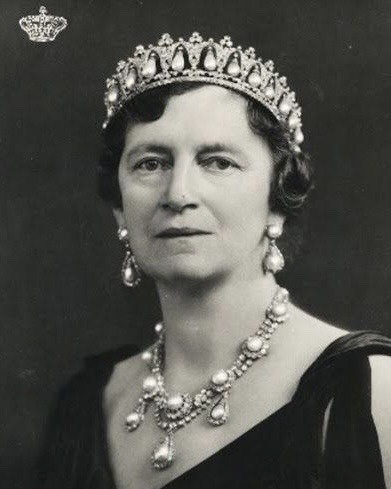

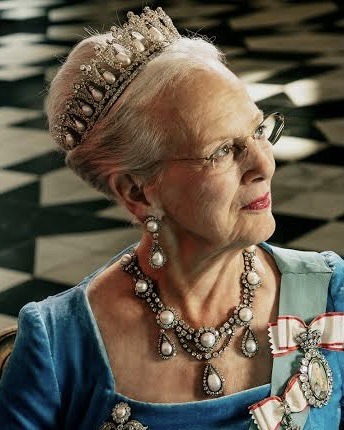
Royal Tiaras Highlights: The Pearl Poiré Tiara
This tiara is made of diamonds set with eighteen pear-shaped (or “poiré”) pendant pearls, and a matching diamond brooch with five pearl pendants. The piece is believed to have been made in the first half of the nineteenth century, likely as a wedding gift to Princess Louise of Prussia for her marriage to Prince Frederik of the Netherlands in 1825.
In 1849, Prince Frederik and Princess Louise’s eldest daughter, Princess Louise, got married to Prince Charles of Sweden; later becoming King Charles XV and Queen Louise of Sweden and Norway. When Princess Louise died, tiara was left for daughter Queen Louise, and eventually passed down to her daughter, Princess Lovisa. Lovisa got married to Crown Prince Frederik of Denmark in 1869, and she took the tiara with her to Copenhagen. The piece remains with the Danish Royal Family ever since.
52 notes
·
View notes
Text
Mais comment oses-tu venir ici avec ta horde de rats immondes?
Papy fait de la résistance, 1983
3 notes
·
View notes
Photo

Operation Corned Beef (L'opération Corned Beef), french lobby card. 1991
#Lobby Cards#submission#Operation Corned Beef#L'opération Corned Beef#Jean-Marie Poiré#Lobby Card#Jean Reno
4 notes
·
View notes
Text
youtube
Le Père Noël est une ordure, directed by Jean-Marie Poiré
Monsieur Prescovic, original soundtrack by Vladimir Cosma
#le père noel est une ordure#jean-marie poiré#le splendid#vladimir cosma#ost#soundtrack#monsieur prescovic#Youtube
2 notes
·
View notes
Text

1982 - LE PERE NOEL EST UNE ORDURE de Jean-Marie Poiré
2 notes
·
View notes
